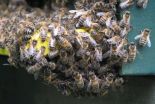(Press-News.org) EAST PROVIDENCE, R.I. – Newly released findings from Bradley Hospital published in the Journal of the American Academy of Child & Adolescent Psychiatry have found that autism spectrum disorders (ASD) affect the brain activity of children and adults differently.
In the study, titled "Developmental Meta-Analysis of the Functional Neural Correlates of Autism Spectrum Disorders," Daniel Dickstein, M.D., FAAP, director of the Pediatric Mood, Imaging and Neurodevelopment Program at Bradley Hospital, found that autism-related changes in brain activity continue into adulthood.
"Our study was innovative because we used a new technique to directly compare the brain activity in children with autism versus adults with autism," said Dickstein. "We found that brain activity changes associated with autism do not just happen in childhood, and then stop. Instead, our study suggests that they continue to develop, as we found brain activity differences in children with autism compared to adults with autism. This is the first study to show that."
This new technique, a meta-analysis, which is a study that compiles pre-existing studies, provided researchers with a powerful way to look at potential differences between children and adults with autism.
Dickstein conducted the research through Bradley Hospital's PediMIND Program. Started in 2007, this program seeks to identify biological and behavioral markers—scans and tests—that will ultimately improve how children and adolescents are diagnosed and treated for psychiatric conditions. Using special computer games and brain scans, including magnetic resonance imaging (MRI), Dickstein hopes to one day make the diagnosis and treatment of autism and other disorders more specific and more effective.
Among autism's most disabling symptoms is a disruption in social skills, so it is noteworthy that this study found significantly less brain activity in autistic children than autistic adults during social tasks, such as looking at faces. This was true in brain regions including the right hippocampus and superior temporal gyrus—two brain regions associated with memory and other functions.
Dickstein noted, "Brain changes in the hippocampus in children with autism have been found in studies using other types of brain scan, suggesting that this might be an important target for brain-based treatments, including both therapy and medication that might improve how this brain area works."
Rowland Barrett, Ph.D., chief psychologist at Bradley Hospital and chief-of-service for The Center for Autism and Developmental Disabilities was also part of the team leading the study.
"Autism spectrum disorders, including autistic disorder, Asperger's disorder, and pervasive developmental disorder not otherwise specified (PDD-NOS), are among the most common and impairing psychiatric conditions affecting children and adolescents today," said Barrett. "If we can identify the shift in the parts of the brain that autism affects as we age, then we can better target treatments for patients with ASD."
###The principal affiliation of Dickstein is Bradley Hospital (a member hospital of the Lifespan health system in Rhode Island). He is also an associate professor of both psychiatry and human behavior and pediatrics at The Warren Alpert Medical School of Brown University.
About Bradley Hospital
Founded in 1931, Bradley Hospital (http://www.bradleyhospital.org), located in East Providence, R.I., was the nation's first psychiatric hospital devoted exclusively for children and adolescents. It remains a nationally recognized center for children's mental health care, training and research. Bradley Hospital was awarded the distinction of 'Top Performer on Key Quality Measures for 2011' by The Joint Commission, the leading accreditor of health organizations in the U.S. Bradley Hospital is the only hospital in Rhode Island and the only psychiatric hospital in New England to receive this designation. Bradley Hospital is a member of the Lifespan health system and is a teaching hospital for The Warren Alpert Medical School of Brown University. Follow us on Facebook (http://www.facebook.com/BradleyHospital) and on Twitter (@BradleyHospital).
Bradley Hospital researchers find age-related changes in how autism affects the brain
Findings come from a first-ever large-scale study of brain activity in children versus adults with autism that could lead to more targeted treatments for autism spectrum disorders
2013-03-13
ELSE PRESS RELEASES FROM THIS DATE:
Events in the future seem closer than those in the past
2013-03-13
We say that time flies, it marches on, it flows like a river — our descriptions of time are closely linked to our experiences of moving through space. Now, new research suggests that the illusions that influence how we perceive movement through space also influence our perception of time. The findings provide evidence that our experiences of space and time have even more in common than previously thought.
The research, conducted by psychological scientist Eugene Caruso of the University of Chicago Booth School of Business and colleagues, is published in Psychological ...
Study reveals 10 factors in wrongful conviction cases
2013-03-13
Why do innocent people go to jail in the United States every year for violent crimes they did not commit? It's a serious question representing the ultimate miscarriage of justice—taking away the freedom of a factually innocent person while also allowing the guilty person to remain free. The U.S. Department of Justice's National Institute of Justice (NIJ) wanted to learn answers to prevent wrongful convictions in the first place.
Jon B. Gould, J.D., Ph.D., a professor and the director of the Washington Institute for Public and International Affairs Research at American ...
Punishment can enhance performance, Nottingham academics find
2013-03-13
The stick can work just as well as the carrot in improving our performance, a team of academics at The University of Nottingham has found.
A study led by researchers from the University's School of Psychology, published recently in the Journal of Neuroscience, has shown that punishment can act as a performance enhancer in a similar way to monetary reward.
Dr Marios Philiastides, who led the work, said: "This work reveals important new information about how the brain functions that could lead to new methods of diagnosing neural development disorders such as autism, ADHD ...
Normal prion protein regulates iron metabolism
2013-03-13
An iron imbalance caused by prion proteins collecting in the brain is a likely cause of cell death in Creutzfeldt-Jakob disease (CJD), researchers at Case Western Reserve University School of Medicine have found.
The breakthrough follows discoveries that certain proteins found in the brains of Alzheimer's and Parkinson's patients also regulate iron. The results suggest that neurotoxicity by the form of iron, called redox-active iron, may be a trait of neurodegenerative conditions in all three diseases, the researchers say.
Further, the role of the normal prion protein ...
Ancient Chinese coin found on Kenyan island by Field Museum expedition
2013-03-13
A joint expedition of scientists led by Chapurukha M. Kusimba of The Field Museum and Sloan R. Williams of the University of Illinois at Chicago has unearthed a 600-year-old Chinese coin on the Kenyan island of Manda that shows trade existed between China and east Africa decades before European explorers set sail and changed the map of the world.
The coin, a small disk of copper and silver with a square hole in the center so it could be worn on a belt, is called "Yongle Tongbao" and was issued by Emperor Yongle who reigned from 1403-1425AD during the Ming Dynasty. The ...
Answering messages behind the wheel is as dangerous as being twice over the limit
2013-03-13
Scientists from various Australian universities in collaboration with the University of Barcelona have compared the effects of mobile use while driving with the effects of alcohol using a simulation. Their experiment demonstrates that using a handsfree kit or sending text messages is the same as being above the legal alcohol limit.
The Australian universities of Wollongong, Victoria, Swinburne of Technology, the Institute for breathing and sleep and the University of Barcelona have measured the reaction capacity behind the wheel of twelve healthy volunteers who participated ...
Immune cells cluster and communicate 'like bees,' researcher says
2013-03-13
The immune system's T cells, while coordinating responses to diseases and vaccines, act like honey bees sharing information about the best honey sources, according to a new study by scientists at UC San Francisco.
"In the morning, each bee goes looking individually for a sugar source, then comes back to the hive and does a dance in front of the other bees describing the location of what it's found, which helps the hive decide collectively where the best source is," said senior scientist Matthew Krummel, PhD, a UCSF professor of pathology.
They don't bust the same ...
UT study identifies ways children can meet recommended activity goals
2013-03-13
KNOXVILLE—Despite overwhelming evidence about the benefits of physical activity for children, most American youngsters are not meeting the federal recommendation of 60 minutes a day.
A new study by a team of University of Tennessee researchers has identified specific ways—and estimated minutes for each approach—that can help children achieve the recommended daily physical activity goal.
The results of various approaches, ranging from mandatory physical education in school to changes in playground designs, were published recently in the American Journal of Preventive ...
Polo takes the bait
2013-03-13
KANSAS CITY, MO—A seemingly obscure gene in the female fruit fly that is only active in cells that will become eggs has led researchers at the Stowers Institute for Medical Research to the discovery of a atypical protein that lures, traps, and inactivates the powerful Polo kinase, widely considered the master regulator of cell division. Its human homolog, Polo-like kinase-1 (Plk1), is misregulated in many types of cancer.
Stowers Investigator and senior author R. Scott Hawley, Ph.D., hopes that this highly selective kinase trap might give drug developers, who are working ...
Medicare spending for advanced cancer not linked to survival differences
2013-03-13
Substantial regional variation in Medicare spending for patients with advanced cancer is not linked to differences in survival, according to a study published March 12 in the Journal of the National Cancer Institute.
Cancer care accounts for approximately 10% of Medicare spending, and costs are highest for cancer patients with late-stage disease. Prior research studies have shown that there are large regional differences in spending within the Medicare program, however it is unknown if higher average regional spending for advanced cancer is linked to improved survival ...
LAST 30 PRESS RELEASES:
Justice after trauma? Race, red tape keep sexual assault victims from compensation
Columbia researchers awarded ARPA-H funding to speed diagnosis of lymphatic disorders
James R. Downing, MD, to step down as president and CEO of St. Jude Children’s Research Hospital in late 2026
A remote-controlled CAR-T for safer immunotherapy
UT College of Veterinary Medicine dean elected Fellow of the American Academy of Microbiology
AERA selects 34 exemplary scholars as 2026 Fellows
Similar kinases play distinct roles in the brain
New research takes first step toward advance warnings of space weather
Scientists unlock a massive new ‘color palette’ for biomedical research by synthesizing non-natural amino acids
Brain cells drive endurance gains after exercise
Same-day hospital discharge is safe in selected patients after TAVI
Why do people living at high altitudes have better glucose control? The answer was in plain sight
Red blood cells soak up sugar at high altitude, protecting against diabetes
A new electrolyte points to stronger, safer batteries
Environment: Atmospheric pollution directly linked to rocket re-entry
Targeted radiation therapy improves quality of life outcomes for patients with multiple brain metastases
Cardiovascular events in women with prior cervical high-grade squamous intraepithelial lesion
Transplantation and employment earnings in kidney transplant recipients
Brain organoids can be trained to solve a goal-directed task
Treatment can protect extremely premature babies from lung disease
Roberto Morandotti wins prestigious Max Born Award for pioneering research in quantum photonics
Scientists map brain's blood pressure control center
Acute coronary events registry provides insights into sex-specific differences
Bar-Ilan University and NVIDIA researchers improve AI’s ability to understand spatial instructions
New single-cell transcriptomic clock reveals intrinsic and systemic T cell aging in COVID-19 and HIV
Smaller fish and changing food webs – even where species numbers stay the same
Missed opportunity to protect pregnant women and newborns: Study shows low vaccination rates among expectant mothers in Norway against COVID-19 and influenza
Emotional memory region of aged brain is sensitive to processed foods
Neighborhood factors may lead to increased COPD-related emergency department visits, hospitalizations
Food insecurity impacts employees’ productivity
[Press-News.org] Bradley Hospital researchers find age-related changes in how autism affects the brainFindings come from a first-ever large-scale study of brain activity in children versus adults with autism that could lead to more targeted treatments for autism spectrum disorders



